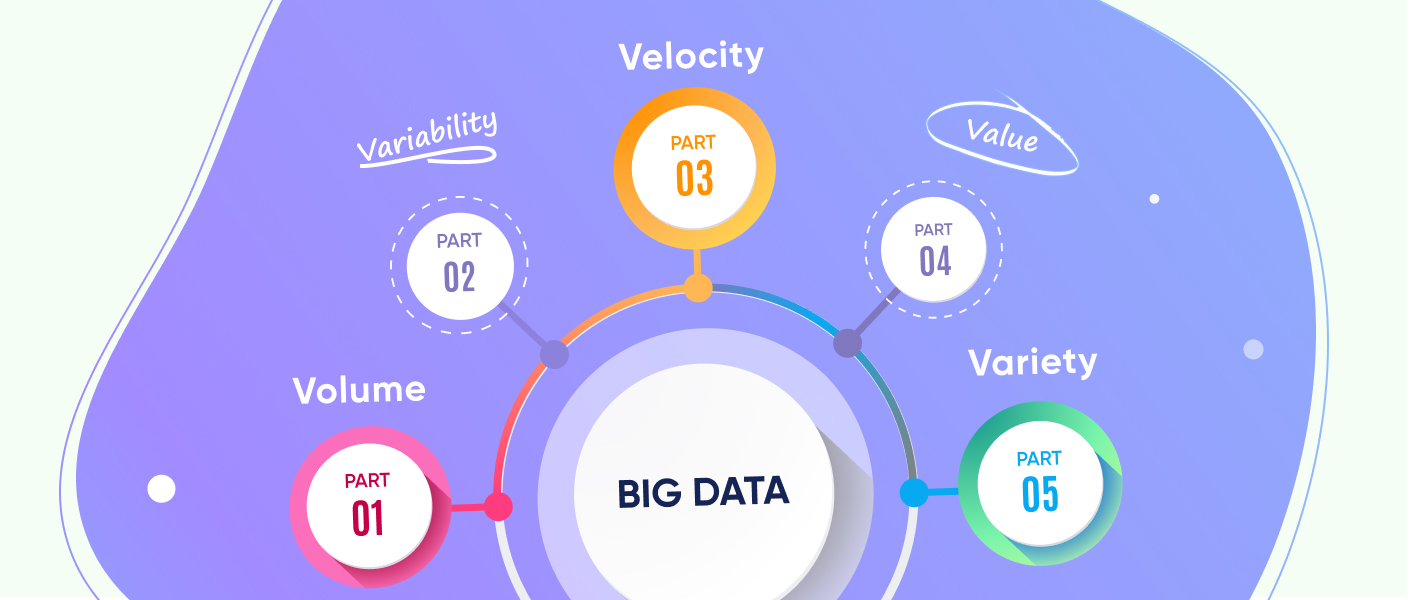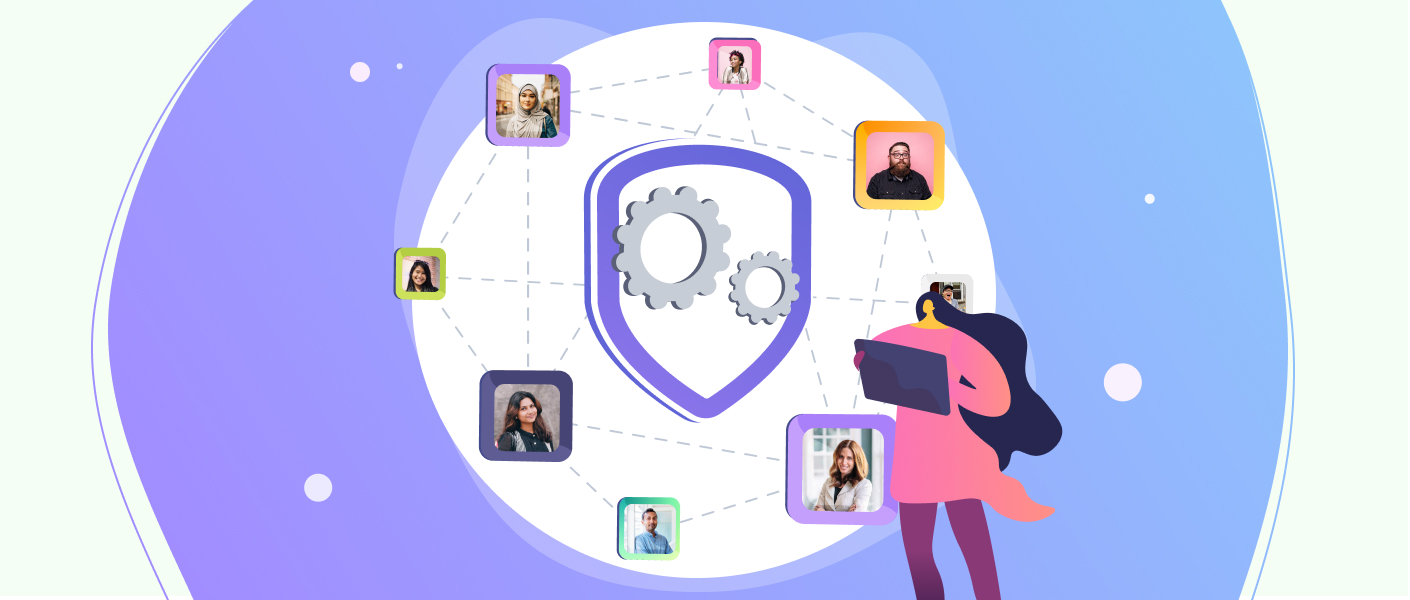Big Data is a complex and voluminous collection of different information with benefits of big data for both business owners and customers. It requires preprocessing to obtain valuable information so it can be beneficial to enterprises and organizations.
This term defines the masses of information that cannot be processed or analyzed using traditional methods of human labor and desktop computers. The peculiarity of Big Data is that the data array continues to grow exponentially over time, therefore, the processing power of supercomputers is required for the operational analysis of the collected materials. Accordingly, Big Data processing requires cost-effective, innovative methods of processing information and providing conclusions.
How Does Big Data Work?

Analyzing Big Data starts with its collecting. The information is received from everywhere: from smartphones, credit cards, software applications, cars. Websites are capable of transferring huge amounts of data. Due to the different formats and ways of Big Data origin, they differ in a number of characteristics. Basically, to say that some array of information is Big to be a Big Data, it has to be:
VVV rule:
-
Volume. The data is measured by physical value and occupied space on a digital medium. The "big" includes arrays over 150 GB per day.
-
Velocity. The information is regularly updated and real-time processing requires intelligent big data technology.
-
Variety. The information in arrays can be structured partly, completely, and accumulate unsystematically. For example, social networks use big data in the form of text, video, audio, financial transactions, pictures, and more.
Nowadays, specialists include two additional factors:
-
Variability.The data streams can have peaks and troughs, seasonality, periodicity. Bursts of unstructured information are difficult to manage and require powerful processing technologies.
-
Value. The information can have different complexity for perception and processing, which complicates the work of intelligent systems. For example, an array of messages from social networks is one level of data, and transactional operations are another. The task of machines is to determine the degree of importance of the incoming information to structure quickly.
The big data technology operation principle is based on the possibility of providing the user with maximum information about any object or phenomenon. The purpose of such familiarization with the data is to help see the pros and cons to make the right decision.
The basic idea behind Big Data analysis is that the more information you know, the faster you can find a solution and make the right decision. In most cases, the process of collecting information is completely automated. There are advanced tools that run millions of actions at the same time to give the company the best possible result.
Big data comes from many different sources: transaction information, CRM, web analytics tools, mobile apps, weather reports, social media, research repositories, and so on. The data can be presented in raw form or pre-processed with mining tools so that it is ready to use (for example, so that company analysts create hypotheses).
Big Data Sources
To get big data, the specialist has to have sources of relevant information. Among them:
-
Internet blogs, social networks, websites, media, and various forums
-
Corporate information: archives, transactions, databases
-
Readouts like meteorological devices, cellular sensors, and others.
When working with Big Data technologies one should remember about next factors:
-
System extendability means horizontal scalability of information carriers
-
Failure resistance means the servers should have a fault tolerance
-
Localization means the spare information arrays are stored and processed within one server.
Why Use Big Data?

The more you know about a specific object or phenomenon, the more accurately you comprehend the essence and can predict the future. By capturing and processing data streams from the Internet and other sources of information companies can predict the demand for products, and emergency services can prevent man-made disasters. Check what big data can help you with apart from the business.
-
Health care. Big Data helps with finding treatment options, getting more knowledge, learning more about medicines.
-
Disasters prevention. The most accurate forecast in the area might save thousands of lives. Law enforcement. Big data is helpful when predicting possible crimes.
Basically, Big Data accumulates all knowledge on the specific team so it helps to predict what will happen next.
Why Use Big Data in Your Business?
And of course, you can see the importance of Big Data for your business. Like such:
-
Simpler planning
-
Faster launches of new projects
-
Higher chances for the project to be in demand
-
Easier measurement of the user satisfaction
-
Faster engagement of the target audience
-
Easier to communicate with both clients and contractors
-
Simpler optimization of the supplement delivery
Big Data makes both your life and business easier. And easier is always better for the customer.
How the Data is Collected?

All the processes of working with Big Data analysis can be divided into three stages: integration, management, and analysis.
Stage 1: Integration
At this first stage, you must determine the goals of implementing Big Data, select tools for collecting information, and also link them to its sources of incoming data.
Stage 2: Management
At this stage, you select a platform (local storage, private/public cloud big data technologies) for storing information.
Stage 3: Analysis
Big Data should always work for the business, but it starts to be useful only after its analysis. This is the final stage of interaction with Big Data.
Examples of Big Data in Action
Let’s check how different business owners use Big Data to their advantage and why is data analysis important.
Entertainment
Entertainment organizations analyze customer and behavioral data to create the most precise target audience profile.
-
It can help to create the content for different target audiences
-
It can develop the personal recommendations
-
It can measure the content’s effectiveness
One of the well-known examples is the Spotify app which collects data of all the users for providing further recommendations.
Advertisement
Advertisers are some of the biggest players in the big data space. Any online giant company tracks users’ behavior. As a result, they provide advertisers with all the necessary data to pinpoint their ad campaigns. Facebook is a great example here. When adjusting an ad you can put information that will follow the particular people.
Medical Industry
Big data and analytics in healthcare are used to improve the quality of life, treat disease, reduce overhead, and predict epidemics. By using Big Data, hospitals can improve patient care.
B2B and B2C Sales
Big Data analysis can do a lot for your business, like Interacting with suppliers, buyers, analyzing the stocks in a warehouse, forecasting the sales, etc.
Government Institutions
Such institutions can account for tax revenue, collect and analyze the Internet data (news, social networks, forums, etc.) to counter extremism and organized crime, optimize transport, and so on.
Banking
Collecting and analyzing information helps banks to fight fraud, effectively work with clients, manage the branches’ work, and so on.
Owlab Expertise
We create such environments where you can work with Big Data technologies in any desired direction. To work with Big Data products we use:
-
Python
-
ReactJS
-
Kubernetes
-
Django
-
NestJs
-
PostgreSQL
-
WebSockets: iOS (Swift)
-
WebSockets: Android (Java, Kotlin)
These help us to bring the bet results to you, and you can bring the best results to your client. Sounds great, isn’t it?
What Will Happen to Big Data in the Future?

Big data is already a game-changer in many areas and will undoubtedly continue to grow. The amount of data available to us will only increase, and technologies for analysis will become more sophisticated. Big data is one of those things that will shape the future of humanity and it has its own Big Data trends.
In the future, Big Data will be everywhere. It will help to make our lives and businesses better. Have you heard the “knowledge is power” saying? Well, that’s what is Big Data all about. It simply gets every piece of information on a particular topic and then can predict an important occasion.
When the question “what is data analytics?” and “what is data analysis?” arise, we want to give you the next example, that is easy to understand.
It is like if you had a robot in 2050 and every morning it creates a suitable wardrobe for you based on your plans and weather. It knows what food you need and want and all your extra habits like olives and pineapples on your pizza.
This happens because the so-called robot collects all the info you provide, analyses it, and can predict the outcome pretty closely.
Final Thoughts
Finding Big Data solutions when you have all the information you need is easier. This is why leveraging Big Data gives companies a competitive edge. To develop an up-to-date product, draw up an effective work plan, prevent equipment failures, create a “catchy” advertising offer for users – all this can be done thanks to the big data analytics services.
FAQ
Who Benefits From Big Data?
Well, basically anyone. Business owners have a chance to study their target audience and loyal customers to bring better and more suitable products, create engaging advertisements, and be on the same page in general. This is a huge Big Data advantage for both product and marketing.
It also helps to analyze pieces of information in the medical field to find new cures or to predict the illness of the patient based on the known data.
And for many other organizations that need to accumulate all experience of many people, analyze it, and create something great or solve a particular issue.
What Is Big Data and Why It Matters?
No person can analyze, systematize, and understand in a lifetime what Big Data and data analytics do in one sitting. This is why it brings uncanny abilities to get into the mind of the client, per se.
You will never ever find such a specialist as a Big Data technology.